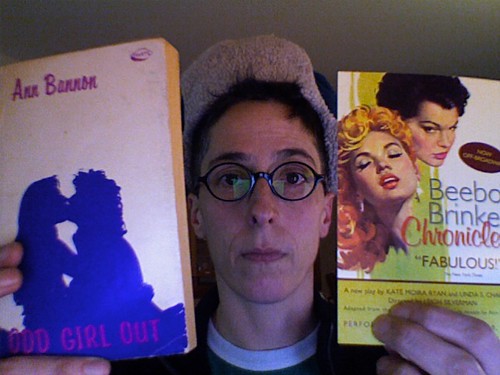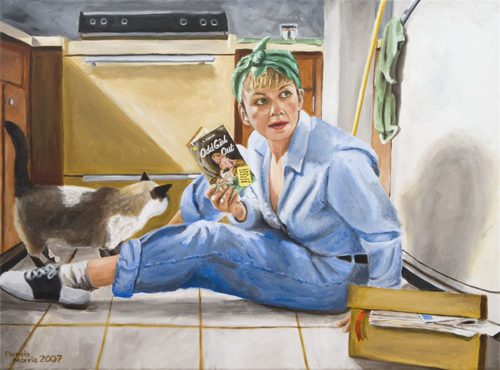
"There Are Some Things They Will Never Know" © Pamela Morris, 2007
Tributes & Awards
“[Ann Bannon’s] pioneering lesbian novels were an inspiration to me when I was writing my own, first as Lesley Evans and then as Jill Emerson. … I can’t tell you how gratified I was when Ann embraced me as one of the last of the midcentury lesbian novelists.” — author Lawrence Block, from a blog post “My Life as a Lesbian,” in which he describes when he first met Ann, as guests on an episode of Fresh Air in 1999
“Thank you for these wonderful, brave books, that are also so readable and well written. You have made such a difference, and you are an enduring heroine for lesbians and their friends everywhere”. —Cathy Bryant
Artist Pamela Morris says about her painting above: “By far the most fun I have had painting in a very long time. Inspired by this quote: ‘… Once they had purchased [the books], they took the books home, read and re-read them, cherished them, and then hid them behind the fridge, in shoe boxes in their closets, under mattresses. It was a life-changing event if a spouse, a parent, or even a child found the books and challenged the reader,’ from the foreword to the 2001 edition of Odd Girl Out by Ann Bannon. I painted it for me, and anyone else who ever felt it necessary to hide such an essential part of themselves in their own homes. I painted it in gratitude for seemingly small voices who spoke out about what’s important, even if they couldn’t have it themselves. Your words mattered, and they still do.”
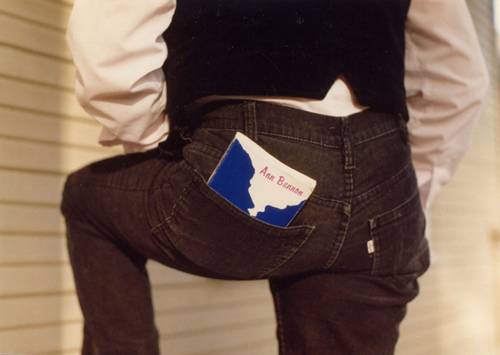
"A devoted Beebo Brinker fan is never caught without something to read!” photo © Pat Gargaetas, 1983
“I’ve worked with a lot of famous GLBT writers — Edward Albee, E. Lynn Harris, Leslie Feinberg, Samuel R. Delaney, Marijane Meaker, Andrew Holleran, and Dennis Cooper, to name just a handful that I especially enjoyed working with — but I think of all of them, I’m closest to Ann Bannon and Edmund White. I spent a lot of time with Ann when I was starting off in San Francisco, shepherding her re-issues through publication [by Cleis Press] and attending many, many readings, and in the process came to feel as if she were my lesbian mother. Considering how warm and caring Ann is, I don’t see how anyone could not feel this way! As lovable as she is at her events, let me assure you that Ann is even more lovable when you know her personally. …” —Don Weise (Editor-in-Chief, Alyson Books), “Whither Gay Literature?”, The Gay and Lesbian Review, May–June 2009.
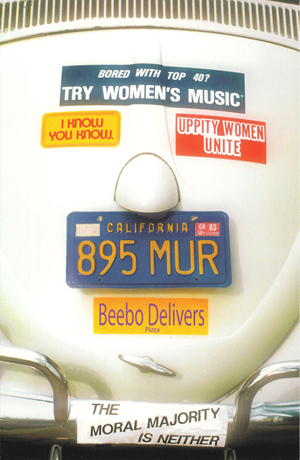
“Beebo Delivers” photo © Pat Gargaetas, circa 1983
Photographer Pat Gargaetas: “From Odd Girl Out—the second best selling original paperback of 1957—to the current theatrical productions of “The Beebo Brinker Chronicles” based on the original series of novels, Ann Bannon’s classic lesbian pulps continue to resonate with modern audiences. Literally generations of lesbians have read the stories of Laura, Beth, and Beebo. Unlike the typical lesbian pulps of the day, in Ann Bannon’s novels, the girl gets the girl, and no one has to be punished or die. Beebo has always delivered considerably more than pizza.”
“As to Beebo, I do not exaggerate the impact your books had on an entire generation of lesbians — probably more. You have done what so few of us can claim — you altered the course of history for an entire group of people and saved lives while doing it. We are all in your debt.” —Radclyffe, author, editor, and publisher of Bold Strokes Books (May 2009)
Author and poet Dorothy Allison: “When I was young, Bannon’s books let me imagine myself into her New York City neighborhoods of short-haired, dark-eyed butch women and stubborn, tight-lipped secretaries with hearts ready to be broken. Her books come close to the kind of books that had made me feel fatalistic and damned in my youth, but somehow she just managed to sustain a sense of hope. And of course, there was her romantic portrait of the kind of butch woman I idealized. I would have dated Beebo, no question …”
Cartoonist and author Alison Bechdel (Dykes to Watch Out For and Fun House): “I’ve read all the Beebo books multiple times. As a young lesbian in the nineteen eighties, I was fascinated with the idea of what my life might have been like if I’d been born just a little earlier, and Bannon’s fictional world gave me a vivid sense of that. But even though I was reading the books as artifacts, I still got swept up by the stories and the characters — they’re just great reads.”
Author Katherine V. Forrest describes buying Odd Girl Out: “Overwhelming need led me to walk a gauntlet of fear up to the cash register. Fear so intense that I remember nothing more, only that I stumbled out of the store in possession of what I knew I must have, a book as necessary to me as air … I found it when I was eighteen years old. It opened the door to my soul and told me who I was. … Beebo Brinker is the final book [in the Beebo Brinker Series], a prequel to the four books, delineating the origins of the title character, arguably still the most iconic figure in all of lesbian fiction. The five books, vividly written and textured with characterization and setting, charged with passion and color, are especially treasured because they portray the only community most of us knew we had back then, the almost mythic Greenwich Village. The Beebo Brinker Series without question will remain a part of our permanent literature.” —Katherine V. Forrest (editor), in her introduction to Lesbian Pulp Fiction: The Sexually Intrepid world of Lesbian Paperback Novels 1950-1965 (Cleis Press, 2003)
“I was lucky enough to live in Northampton, Massachusetts, where there was a women’s bookstore called Womonfyre. And that’s where I discovered Beebo Brinker (thank you, thank you, thank you, Ann Bannon!). Beebo saved my life. I fell in love with Beebo fast and hard. Beebo gave me the courage to be myself…” —Leslea Newman (Heather has Two Mommies, 20th Anniversary ed., Alyson; Nobody’s Mother, poems, Orchard House; and The Reluctant Daughter, novel, Boldstrokes; www.lesleanewman.com)
Joan Nestle, co-founder of the Lesbian Herstory Archives: “Called trash by the literary world and pornography by the commercial world, Ann Bannon’s books were hidden away on drugstore pulp racks. To pick out the book, carry it to the counter, and then face the other shoppers and the cashier was tantamount to coming out. But all across the country, lesbians were doing it… ”
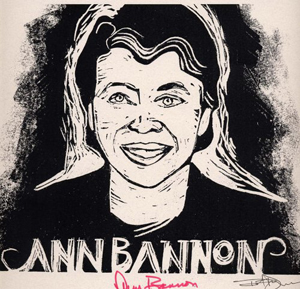
“Ann Bannon” © Pat Dawson, 2002
“The author whose name has remained the ‘brightest’ in the canon of lesbian pulp is Ann Bannon, whose five-book series of Greenwich Village escapades is now firmly ensconced as the premier fictional representation of lesbian life in the 1950s and 1960s.” —Christopher Nealon, Foundlings: Lesbian and Gay Historical Emotion before Stonewall (Duke, 2001)
“The popularity of Bannon’s books over the decades was reflected in the reception accorded her at the OutWrite National Lesbian and Gay Writers Conference panel. While audience members crowded around the dais to meet all the panelists after the presentation, it was Bannon’s fans who remained in adoring crowds long after everyone else had left the hall.” —Kate Brandt, Happy Endings: Lesbian Writers Talk About Their Lives and Work (Naiad Press, 1993)
“Bannon’s books influenced an entire generation of guilt-ridden lesbians: When I asked [Barbara] Grier [Publisher and Editor, Naiad Press] if I were to write about only one author in the lesbian paperback genre, without hesitation she declared, ‘Ann Bannon. Without even a discussion … You’d get that answer from everyone. Everyone would tell you Ann Bannon … There was a triumvirate of Paula Christian, Valerie Taylor, and Ann Bannon. But in terms of actual influence, sales, everything, Bannon … She literally sold hundreds of thousands of copies of her books. She was much more widely distributed than any of them.’” —Paul D. Cain, Leading the Parade: Conversations with American’s Most Influential Lesbians and Gay Men (Scarecrow Press, 2002)
“In [the five Beebo Brinker Books] … Bannon created characters that have not only endured, but remain surprisingly relevant to contemporary lesbian culture. [The books] are sexy and entirely entertaining, and still manage to remind readers of the progress made in the fight for lesbian rights and political and social viability. Impressive work for novels that originally sold for 35 cents at a drugstore counter.” —Rose Yndigoyen, “The Beebo Brinker Chronicles,” After Ellen (June 16, 2006)
Awards

Ann has received the following awards and honors:
Named one of Equality Forum’s LGBT Icons 2012, celebrating the achievements of 31 lesbian, gay, bisexual or transgender icons each day during LGBT History Month in October.
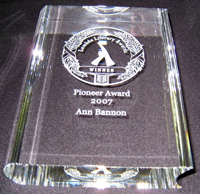 The 2008 Pioneer Lambda Literary
Award from the Lambda Literary Foundation, along with Malcolm Boyd
and Mark Thompson.
The 2008 Pioneer Lambda Literary
Award from the Lambda Literary Foundation, along with Malcolm Boyd
and Mark Thompson.
The 2008 Alice B. Reader’s Appreciation Award, along with seven other lesbian writers: Kim Baldwin, Cate Culpepper, Lauren Wright Douglas, Val McDermid, Joanna Russ, and Therese Szymanski.
The first annual Trailblazer Award, from the Golden Crown Literary Society, 2005.
The Distinguished Service Award for Faculty Excellence by the Alumni Association of Sacramento State University, April 2005.
Ann was inducted into the Saints and Sinners Literary Festival Hall of Fame in 2004.
A “Pressie” for Best Author of the Year 2003, by the Chicago Free Press.
Certificate of Honor by the Board of Supervisors City and County of San Francisco, February 2000.
Outstanding, Pioneering Contribution to Lesbian and Gay Writing by Outlook National Lesbian and Gay Quarterly, March 1990.
